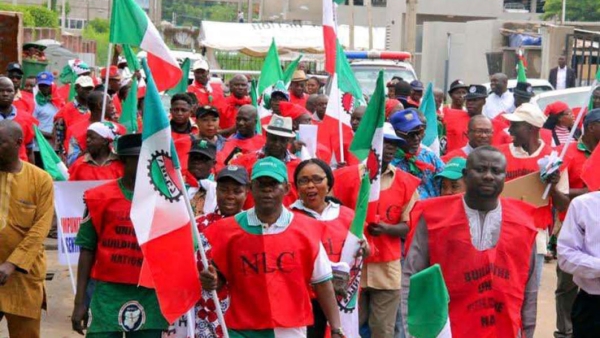Latest News
The Nigeria Labour Congress has revealed why state governors are flouting the Minimum Wage Act.
Assistant General-Secretary of the Nigeria Labour Congress, NLC, Chris Onyeka said the reason is because they do not believe in the sanctity of the law.
Onyeka stated this in Abuja on Monday in an interview with the News Agency of Nigeria on the minimum wage law and its implementation.
He said while workers are anxiously awaiting a new minimum wage to be passed into law, 15 states are yet to implement the N30,000 wage enacted in 2019.
According to him, despite the increased revenue accruable to states after the fuel subsidy removal and the attendant hardships brought about by the hike in pump price, the states are still recalcitrant in paying their workers the minimum wage.
Onyeka identified the states yet to implement the minimum wage, in defiance of the 2019 Act, as Abia, Bayelsa, Delta, Enugu, Nasarawa, Adamawa, Gombe, Niger, Borno, Sokoto, Anambra, Imo, Benue, Taraba, and Zamfara.
“A state governor who does not believe in the sanctity of the laws will have a high proclivity to disobeying them.
“If you examine the history of some of these governors and their handlers, you will find a preponderance of those who came to power by breaking the laws.
“Is it now that they will obey the national minimum wage act?” he asked.
The labour leader said many governors were unwilling to pay civil servants their salaries because they see state resources as theirs and are, therefore, not willing to share with the workers who create the wealth.
Onyeka added that fiscal indiscipline in many states is legendary, and the personal greed of some governors resulted in their appropriating state resources into their private pockets.
He reiterated the need to cut the cost of governance at all levels and end wastages.
He identified the measures to include a reduction in the number of political appointees to reduce overhead, as well as a reduction in the number of logistics, official, and operational vehicles.
Onyeka said the salaries and allowances of elected and appointed officials of the three arms of government should be in sync with what is received by civil servants.
He said the government at all levels should streamline procurement processes to ensure integrity, accountability, fiscal discipline, and transparency.


